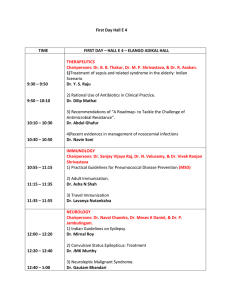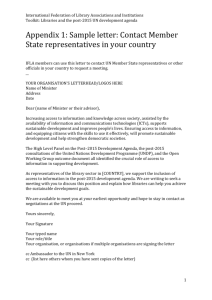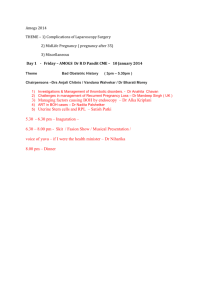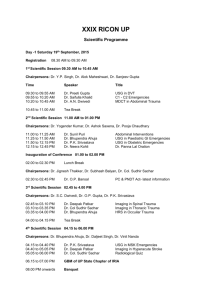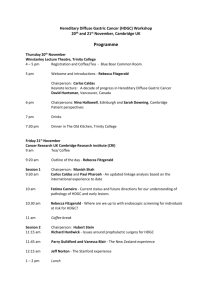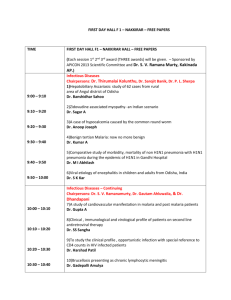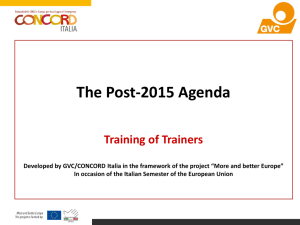Joint Statement on the post
advertisement
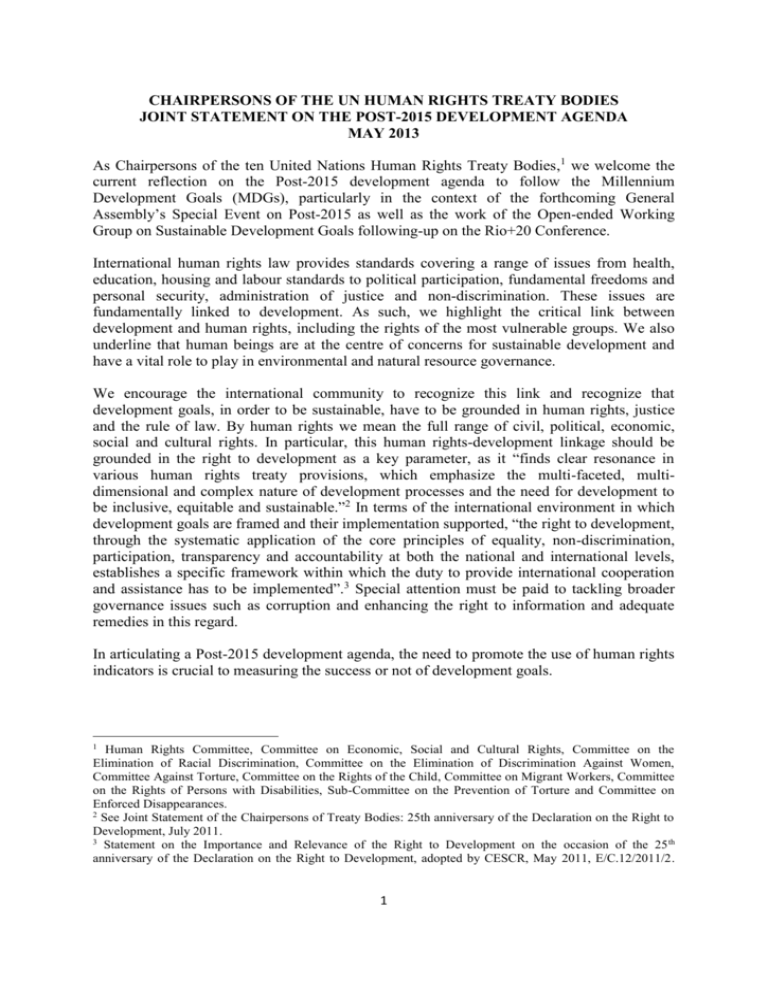
CHAIRPERSONS OF THE UN HUMAN RIGHTS TREATY BODIES JOINT STATEMENT ON THE POST-2015 DEVELOPMENT AGENDA MAY 2013 As Chairpersons of the ten United Nations Human Rights Treaty Bodies,1 we welcome the current reflection on the Post-2015 development agenda to follow the Millennium Development Goals (MDGs), particularly in the context of the forthcoming General Assembly’s Special Event on Post-2015 as well as the work of the Open-ended Working Group on Sustainable Development Goals following-up on the Rio+20 Conference. International human rights law provides standards covering a range of issues from health, education, housing and labour standards to political participation, fundamental freedoms and personal security, administration of justice and non-discrimination. These issues are fundamentally linked to development. As such, we highlight the critical link between development and human rights, including the rights of the most vulnerable groups. We also underline that human beings are at the centre of concerns for sustainable development and have a vital role to play in environmental and natural resource governance. We encourage the international community to recognize this link and recognize that development goals, in order to be sustainable, have to be grounded in human rights, justice and the rule of law. By human rights we mean the full range of civil, political, economic, social and cultural rights. In particular, this human rights-development linkage should be grounded in the right to development as a key parameter, as it “finds clear resonance in various human rights treaty provisions, which emphasize the multi-faceted, multidimensional and complex nature of development processes and the need for development to be inclusive, equitable and sustainable.”2 In terms of the international environment in which development goals are framed and their implementation supported, “the right to development, through the systematic application of the core principles of equality, non-discrimination, participation, transparency and accountability at both the national and international levels, establishes a specific framework within which the duty to provide international cooperation and assistance has to be implemented”.3 Special attention must be paid to tackling broader governance issues such as corruption and enhancing the right to information and adequate remedies in this regard. In articulating a Post-2015 development agenda, the need to promote the use of human rights indicators is crucial to measuring the success or not of development goals. 1 Human Rights Committee, Committee on Economic, Social and Cultural Rights, Committee on the Elimination of Racial Discrimination, Committee on the Elimination of Discrimination Against Women, Committee Against Torture, Committee on the Rights of the Child, Committee on Migrant Workers, Committee on the Rights of Persons with Disabilities, Sub-Committee on the Prevention of Torture and Committee on Enforced Disappearances. 2 See Joint Statement of the Chairpersons of Treaty Bodies: 25th anniversary of the Declaration on the Right to Development, July 2011. 3 Statement on the Importance and Relevance of the Right to Development on the occasion of the 25 th anniversary of the Declaration on the Right to Development, adopted by CESCR, May 2011, E/C.12/2011/2. 1 The current MDGs have made some useful contributions to development. Yet they did not make the link with human rights, with important consequences. The goal of universal primary education did not explicitly refer to the human rights requirement that primary education be free and without discrimination, risking the exclusion of poor, girls, migrants, indigenous persons, and persons with disabilities among others. The goal of gender equality did not ensure the elimination of discrimination against women and equality between women and men, which should be addressed as a global priority in the future agenda, as should respect for the right to liberty and security of the person, and freedom from torture and other cruel, inhuman or degrading treatment. Some human rights that are fundamentally linked to development and poverty eradication were omitted or under-prioritized, such as freedom of expression and of association, including labour rights and decent work, and the right to water and sanitation - so important for the right to life and to meet health-related goals. Insufficient attention to the human rights principle of accountability and access to justice has undermined incentives to reach goals and foreclosed any remedy for people whose rights were by-passed or abused in the development process. In a joint statement of the Chairpersons of the UN human rights treaty bodies, on the occasion of the UN Millennium Summit and High-Level Plenary Meeting of the General Assembly on the MDGs (20-22 September 2010), it was clearly pointed out that, with regard to MDGs, “their realization would still fall short of what human rights treaties require, as treaties call for the realization of human rights for all, which goes beyond the reaching of quantified targets.” Ultimately, the failure to make an explicit link to human rights masked inequalities and frustrated advances. Indeed, in several of the celebrated development ‘success’ stories of the previous decade, underlying repression, deprivation and inequality led to violent mass protest, and the rolling-back of any development gains. The Chairpersons therefore welcome States’ recognition in the Rio+20 Outcome of the importance and utility of future sustainable development goals being consistent with international law, including international human rights law. This lays the ground for developing a Post-2015 development agenda that should deliver freedom from fear and want, in keeping with the legal obligations that States have voluntary undertaken. The Chairpersons call upon the international community to adopt a Post 2015 development agenda that: integrates human rights obligations within the development goals with specific human rights indicators to allow for an objective assessment of progress towards sustainable development grounded in human rights; engages national and international human rights mechanisms, including the treaty bodies and special procedures of the Human Rights Council, in development 2 processes: as accountability mechanisms and as sources of significant human rightsrelated information that can assess progress in meeting development goals and serve as early warning mechanisms where problems, otherwise hidden, might be present. In particular, the Chairpersons call upon the international community to strengthen accountability of all the actors responsible for development. By linking development goals to legal obligations of States under human rights treaties, development actors are more easily held accountable and their responsibilities are better defined. This should provide additional motivation to move forward nationally on the promises made at conferences globally. The Chairpersons maintain that accountability can only be ensured if the overall treaty body system is strengthened, through focus on better reporting behaviour by States parties and better compliance with the recommendations aimed at States. In this context, capacity building for States to discharge their conventional obligations is a common prerequisite to achieve the implementation of human rights norms as well as to implement the Post-2015 development agenda. There is a need to continue to encourage periodic reporting by States parties and to reinforce the centrality of human rights in governance and national development planning. For their part, the Chairpersons commit to continue to be engaged in the reflection on the Post-2015 development agenda. In their own work, the Chairpersons will encourage their Committees to consider the impact of development goals on the rights in their respective treaties. The Chairpersons will also encourage their Committees to draw on development data and reports, as appropriate, in their constructive dialogue with States Parties. The Chairpersons will continue to follow with interest the elaboration of the Post-2015 development agenda as active partners in achieving sustainable development goals that respect human rights and, as emphasised in the 2010 statement by Chairpersons on the occasion of the Millennium Summit, realization of any development goals “should be an important step on the longer, and continuous, road towards the full and effective realization of all human rights for all.” 3
